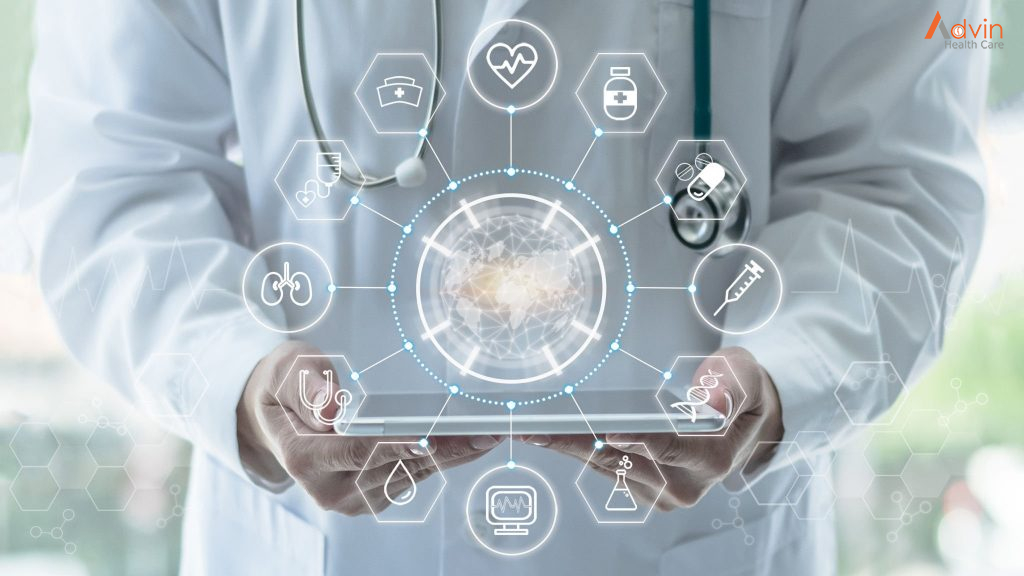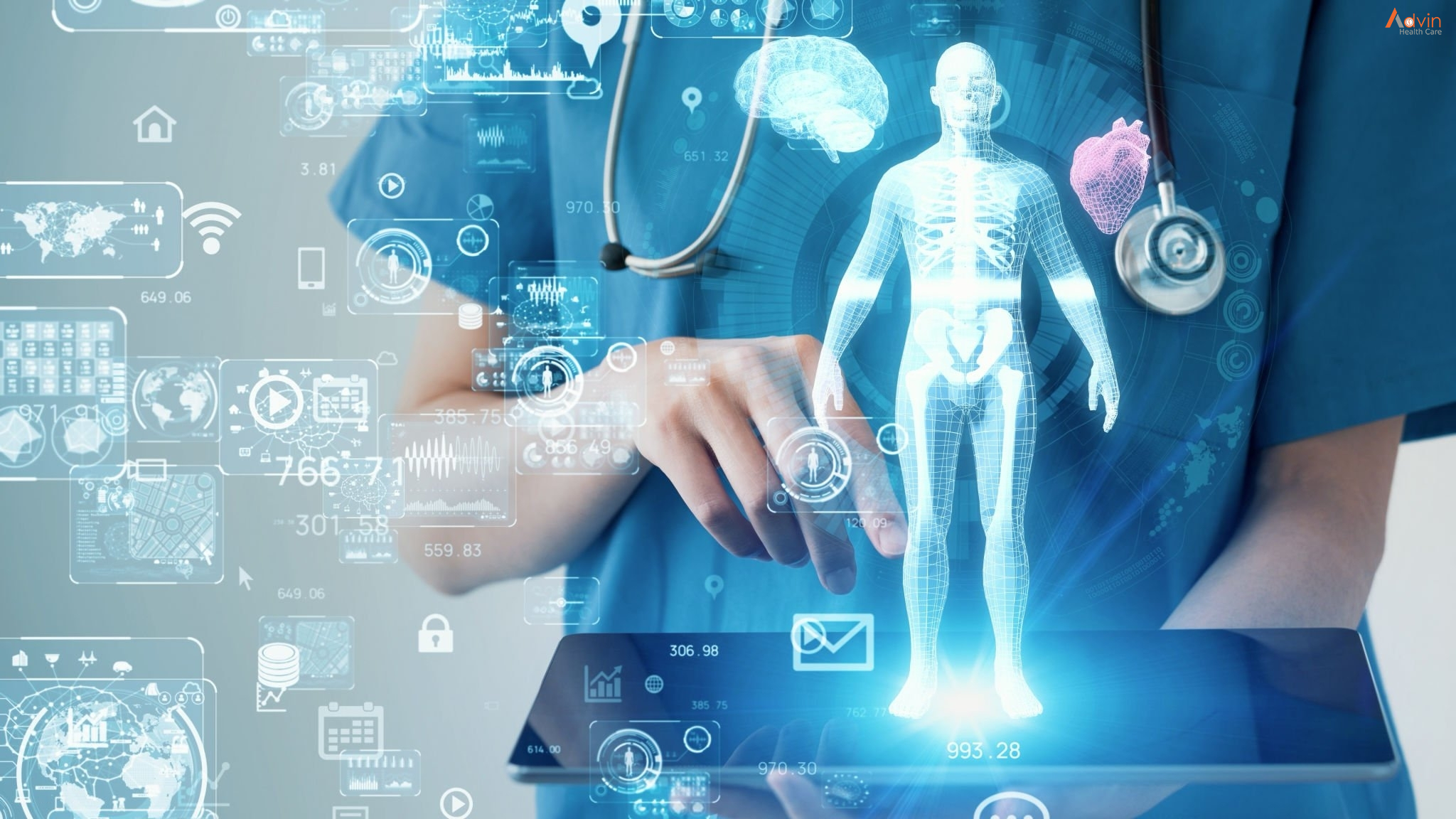Artificial intelligence (AI) and related technologies are increasingly prevalent in business and society, and are beginning to be applied to healthcare. These technologies have the potential to transform many aspects of patient care, as well as administrative processes within provider, payer and pharmaceutical organisations.
There are already a number of research studies suggesting that AI can perform as well as or better than humans at key healthcare tasks, such as diagnosing disease. Today, algorithms are already outperforming radiologists at spotting malignant tumours, and guiding researchers in how to construct cohorts for costly clinical trials. However, for a variety of reasons, we believe that it will be many years before AI replaces humans for broad medical process domains. In this article, we describe both the potential that AI offers to automate aspects of care and some of the barriers to rapid implementation of AI in healthcare.
How AI works in healthcare?
AI is able to analyze large amounts of data stored by healthcare organizations in the form of images, clinical research trials and medical claims, and can identify patterns and insights often undetectable by manual human skill sets.
AI algorithms are “taught” to identify and label data patterns, while NLP allows these algorithms to isolate relevant data. With DL, the data is analyzed and interpreted with the help of extended knowledge by computers. The impact of these tools is huge, considering a Frost & Sullivan analysis indicated artificial intelligence and cognitive computing systems in healthcare will account for $6.7 billion this year from the market compared to $811 million in 2015.
The use of AI is supporting many stakeholders in healthcare:
- Teams of clinicians, researchers or data managers involved in clinical trials can speed up the process of medical coding search and confirmation, crucial in conducting and concluding clinical studies.
- Healthcare payers can personalize their health plans by connecting a virtual agent via conversational AI with members interested in customized health solutions.
- Clinicians can improve and customize care to patients by combing through medical data to predict or diagnose disease faster.
Top 10 uses of AI in healthcare

AI supports medical imaging analysis
AI is used as a tool for case triage. It supports a clinician reviewing images and scans. This enables radiologists or cardiologists to identify essential insights for prioritizing critical cases, to avoid potential errors in reading electronic health records (EHRs) and to establish more precise diagnoses.
A clinical study can result in huge amounts of data and images that need to be checked. AI algorithms can analyze these datasets at high speed and compare them to other studies in order to identify patterns and out-of-sight interconnections. The process enables medical imaging professionals to track crucial information quickly.
AI provides valuable assistance to emergency medical staff
During a sudden heart attack, before ambulance arrival is crucial for recovery. For an increased chance of survival, emergency dispatchers must be able to recognize the symptoms of a cardiac arrest in order to take appropriate measures. AI can analyze both verbal and nonverbal clues in order to establish a diagnostic from a distance.
Corti is an AI tool that assists emergency medicine staff. By analyzing the voice of the caller, background noise and relevant data from medical history of the patient, Corti alerts emergency staff if it detects a heart attack. Like other ML technologies, Corti does not search for particular signals, but it trains itself by listening to many calls in order to detect crucial factors.
Based on this learning, Corti improves its model as an ongoing process. The technology Corti is equipped with can detect the difference between background noise, such as sirens, and clues from the caller, or the patient sounds in the background.
AI analyzes unstructured data
Clinicians often struggle to stay updated with the latest medical advances while providing quality patient-centered care due to huge amounts of health data and medical records. EHRs and biomedical data curated by medical units and medical professionals can be quickly scanned by ML technologies to provide prompt, reliable answers to clinicians.
In many cases, health data and medical records of patients are stored as complicated unstructured data, which makes it difficult to interpret and access. AI can seek, collect, store and standardize medical data regardless of the format, assisting repetitive tasks and supporting clinicians with fast, accurate, tailored treatment plans and medicine for their patients instead of being buried under the weight of searching, identifying, collecting and transcribing the solutions they need from piles of paper formatted EHRs.
AI supports health equity
The AI and ML industry has the responsibility to design healthcare systems and tools that ensure fairness and equality are met, both in data science and in clinical studies, in order to deliver the best possible health outcomes. With more use of ML algorithms in various areas of medicine, the risk of health inequities can occur.
Those responsible for applying AI in healthcare must ensure AI algorithms are not only accurate, but objective and fair. Since many clinical trial guidelines and diagnostic tests take into account a patient’s race and ethnicity that a debate has arisen:
Is the selection of these factors evidence-based? Is race and ethnicity data more likely to solve or to increase universal health inequities? It is established that ML comprises a set of methods that enables computers to learn from the data they process. That means that, at least in principle, ML can provide unbiased predictions based only on the impartial analysis of the underlying data.
AI and ML algorithms can be educated to decrease or remove bias by promoting data transparency and diversity for reducing health inequities. Healthcare research in AI and ML has the potential to eliminate health-outcome differences based on race, ethnicity or gender.
AI can forecast kidney disease
Acute kidney injury (AKI) can be difficult to detect by clinicians, but can cause patients to deteriorate very fast and become life-threatening. With an estimated 11% of deaths in hospitals following a failure to identify and treat patients, the early prediction and treatment of these cases can have a huge impact to reduce life-long treatment and the cost of kidney dialysis.

AI uses data collected for predictive analytics
Turning EHRs into an AI-driven predictive tool allows clinicians to be more effective with their workflows, medical decisions and treatment plan. NLP and ML can read the entire medical history of a patient in real time, connect it with symptoms, chronic affections or an illness that affects other members of the family. They can turn the result into a predictive analytics tool that can catch and treat a disease before it becomes life-threatening.
AI builds complex and consolidated platforms for drug discovery
AI algorithms are able to identify new drug applications, tracing their toxic potential as well as their mechanisms of action. This technology led to the foundation of a drug discovery platform that enables the company to repurpose existing drugs and bioactive compounds.
By combining the best elements of biology, data science and chemistry with automation and the latest AI advances, the founding company of this platform is able to generate around 80 terabytes of biological data that is processed by AI tools across 1.5 million experiments weekly.
The ML tools are created to draw insights from biological datasets that are too complex for human interpretation, decreasing the risk for human bias. Identifying new uses for known drugs is an appealing strategy for Big Pharma companies, since it is less expensive to repurpose and reposition existing drugs than to create them from scratch.
AI accelerates the discovery and development of genetic medicine
AI is also used to help rapidly discover and develop medicine, with a high rate of success. Genetic diseases are favored by altered molecular phenotypes, such as protein binding. Predicting these alterations means predicting the likelihood of genetic diseases emerging. This is possible by collecting data on all identified compounds and on biomarkers relevant to certain clinical trials.
AI can decrease the cost to develop medicines
Supercomputers have been used to predict from databases of molecular structures which potential medicines would and would not be effective for various diseases. By using convolutional neural networks, a technology similar to the one that makes cars drive by themselves, AtomNet was able to predict the binding of small molecules to proteins by analyzing hints from millions of experimental measurements and thousands of protein structures.
This process enabled convolutional neural networks to identify a safe and effective drug candidate from the database searched, reducing the cost of developing medicine.

